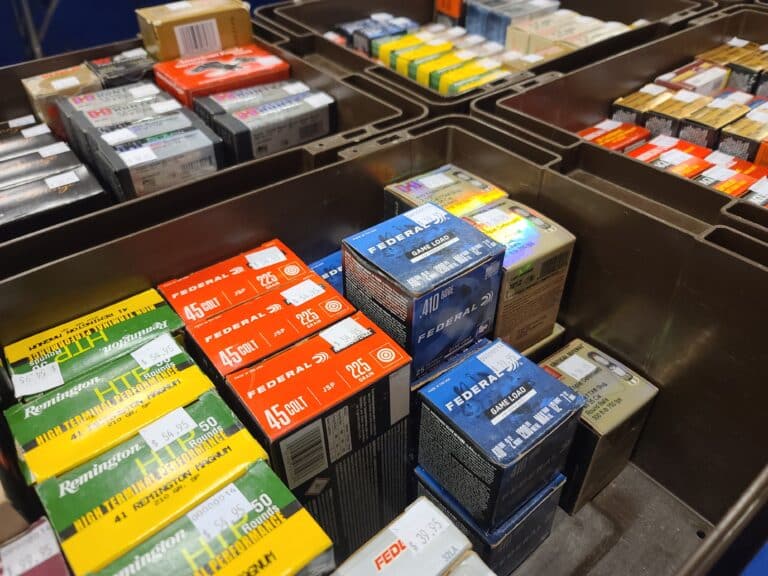The Golden State’s requirement that gun owners pass a background check for every ammunition purchase is unconstitutional, a federal judge ruled Wednesday.
US District Judge Roger Benitez issued a permanent injunction against a collection of California laws requiring criminal background checks on all ammunition purchases and prohibiting the purchase of ammunition in other states. Benitez found that each restriction was at odds with America’s historical tradition of gun regulation and, therefore, “must yield to the Constitution.”
“The ammunition background checks laws have no historical pedigree and operate in such a way that they violate the Second Amendment right of citizens to keep and bear arms,” Judge Benitez wrote in Rhode v. Bonta. “The anti-importation components violate the dormant Commerce Clause and to the extent applicable to individuals travelling into California are preempted by 18 U.S.C. § 926A.”
The ruling invalidates California’s ammunition background check regime, marking a victory for gun-rights advocates in the nation’s most populous state. The opinion, the second issued by Judge Benitez against the restrictions, could serve as a guide to those looking to challenge similar laws in states like New York.
The California Rifle and Pistol Association (CRPA) and multiple-time Olympic gold medalist Kim Rhode first filed the case in 2016. They argued the state’s restrictions placed a costly and unconstitutional burden on the Second Amendment rights of California gun owners. They claimed those restrictions have forced Californians to pay for background checks more than one million times each year to purchase something almost no other state requires a background check on.
The CRPA called the ruling “great news” for gun rights.
“Today’s ruling represents continued affirmation that the Bruen decision, and Heller before that, represent a sea change in the way courts must look at these absurdly restrictive laws,” Chuck Michel, CRPA President & General Counsel, said in a statement. “Sure, the state will appeal, but the clock is ticking on laws that violate the Constitution.”
California Attorney General Rob Bonta (D.) did, indeed, announce he plans to fight the ruling.
“We will seek an immediate stay of the district court decision, to maintain CA’s life-saving, constitutional ammunition laws in Rhode v. Bonta,” he said in a statement. “Background checks save lives. We’ll continue to fight to keep Californians safe and ensure these vital protections remain in place.”
Originally passed via ballot initiative Proposition 63 in 2016, California’s ammunition law was designed to operate as a permit system requiring prospective ammunition purchasers to obtain a four-year license before a sale. The California legislature ultimately opted to amend that system in favor of a point-of-sale background check requirement for every single ammunition purchase, akin to how gun sales are conducted at federally-licensed dealers.
Judge Benitez said that change ultimately put the background check scheme on shakier legal grounds.
“Why legislature eliminated the voter-approved 4-year permit system in favor of an every-purchase background check scheme is not apparent,” he wrote. “Without prejudging the discarded 4-year permit system envisioned by the voters of California, such a system would clearly be a more reasonable constitutional approach than the current scheme.”
Benitez said that because California’s laws implicated the acquisition of ammunition necessary to use a gun, the state’s background check requirement and anti-importation restrictions infringe on the right to keep and bear arms. The ammunition background check system also falsely denies purchases “at least 11 percent of the time,” according to Benitez’s order, further burdening the rights of law-abiding gun owners. To withstand legal scrutiny under the Supreme Court’s most recent legal standard for Second Amendment cases, he said that the burden was on the California Attorney General’s Office to show that the state’s laws comport with the nation’s history and tradition of ammunition regulation. Benitez found that the state failed to identify a single “historical twin” for its modern laws.
“The Attorney General has not identified a single historical law that required a citizen to pass a background check in order to purchase ammunition,” he wrote. “Citizens were free in every state to buy ammunition at any time and without qualification.”
He also said that he was unpersuaded by California’s attempt to cite historical analogues more loosely related to its modern background check scheme, which included bigoted gun and ammunition bans for disfavored minority groups.
“These fifty laws identified by the Attorney General constitute a long, embarrassing, disgusting, insidious, reprehensible list of examples of government tyranny towards our own people,” Benitez wrote.
Beyond the Second Amendment, Benitez also noted that California’s restrictions on sales from out-of-state ammunition dealers conflicted with the federal government’s role in regulating interstate commerce. He said states are generally not permitted to regulate or restrict the flow of legal goods from other states under the dormant Commerce Clause.
“The Attorney General has pointed to no other laws in the nation that erect a similar barrier to this one, keeping away out-of-state ammunition sellers and guaranteeing all sales originate with, or flow through, only in-state ammunition sellers,” he wrote. “The solution, for the benefit of the nation as a whole, is to enjoin enforcement of these protectionist laws and permit out-of-state businesses to sell directly to California’s residents.”
Judge Benitez’s order goes into effect immediately. That means California won’t be able to enforce its ammunition background check law unless and until Attorney General Bonta can get a stay issued by a federal appeals court.






